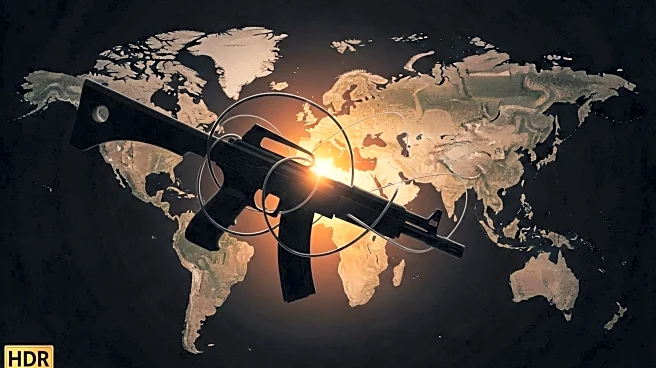What's Happening?
The Sou da Paz Institute has published a study revealing the impact of lax gun laws in Brazil and the United States on the arming of Brazilian criminal organizations. The study analyzed firearm seizures from 2019 to 2023, showing an increase in restricted-use firearms, such as semiautomatic rifles, reaching criminal groups. The research indicates that while most firearms are manufactured in Brazil, the United States is a significant source of both complete firearms and components. The study attributes the rise in illegal firearms to looser gun regulations under former Brazilian President Jair Bolsonaro, which allowed civilians access to weapons previously restricted to military and police use. The number of privately owned firearms in Brazil nearly doubled from 2018 to 2022, with many diverted to the illegal market.
Why It's Important?
The study highlights the international consequences of domestic gun policies, emphasizing the role of U.S. gun laws in facilitating the smuggling of firearms into Brazil. This situation poses significant security challenges for Brazil and underscores the need for international cooperation in addressing organized crime. The findings suggest that U.S. gun laws contribute to the problem by enabling the illegal trade of firearms and components, affecting both domestic and international security.
What's Next?
In response to the study, Brazilian President Luiz Inácio Lula da Silva has implemented stricter gun control measures, reversing the policies of his predecessor. These measures include restoring restrictions on semiautomatic weapons and reducing the number of guns civilians can possess. The U.S. may face pressure to address its role in the international gun trade, potentially leading to discussions on tightening export controls and collaborating with Brazil to combat organized crime.
Beyond the Headlines
The study raises ethical and legal questions about the responsibility of nations in controlling the flow of firearms across borders. It highlights the need for international cooperation in addressing the root causes of gun violence and organized crime. The situation also reflects broader cultural and political debates about gun ownership and regulation, both in Brazil and the United States.










